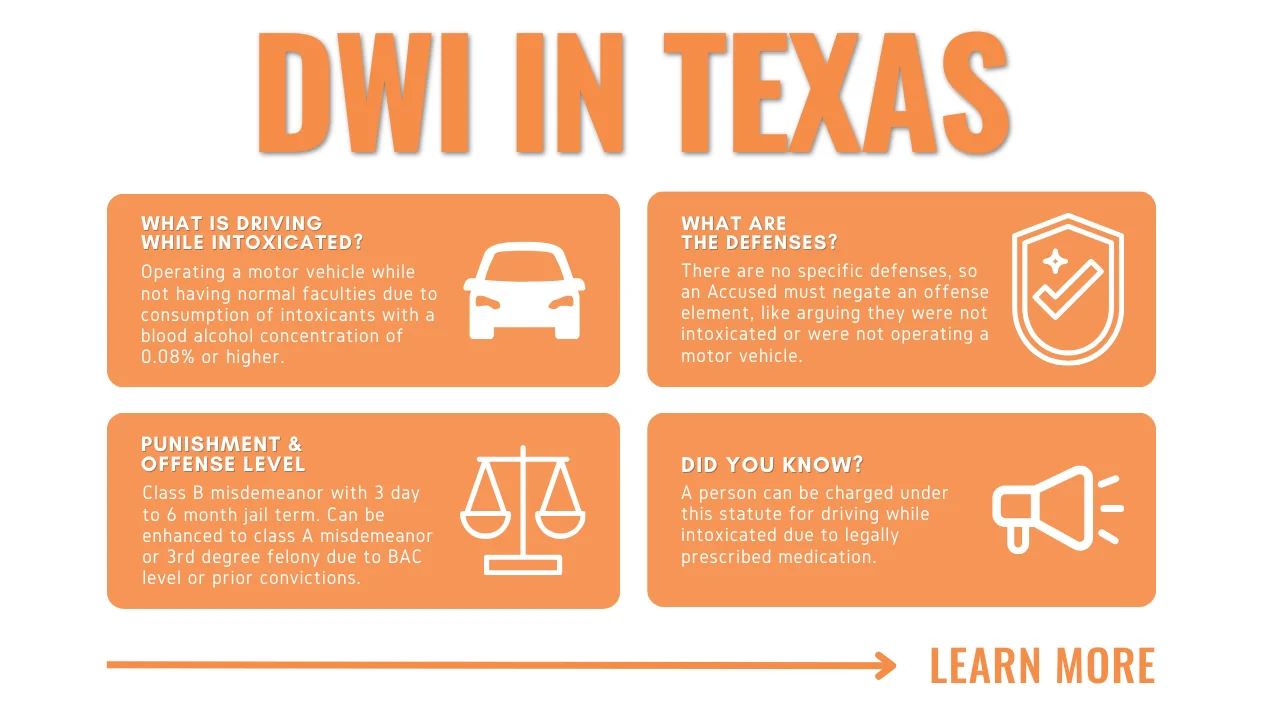
Bail for first-time DWI charges in Texas rarely exceeds $5,000.00. This is the first of many costs associated with the Texas DWI process. Judges have total discretion over bond amounts.
- What is bail for DUI in Texas?Bail is the money a person must pay to be released while their case is pending. Bail acts as a security to secure a person’s presence in court.Cash bail is the oldest form of bail in Texas. However, there is a growing debate about its utility and necessity – especially for misdemeanor offenses.
- What’s the difference between bail and bond? Bail is the money put up to secure release. Bond is the total amount of money that must be posted with the county for a defendant to be released. When attempting to bail someone out of jail, it is first important to ascertain the bond amount.
WHAT ARE THE TYPES OF BOND IN TEXAS?
The five types of bond in Texas are attorney, cash, personal recognizance, property, and surety. Surety bonds are the most common form of bond.
- What is an Attorney Bond? In Texas, and perhaps only in Texas, an attorney can obtain bond capacity with a particular county, empowering the lawyer to post bonds and essentially act as a bondsman. The act of posting a bond forms the attorney client relationship, and the attorney is automatically assigned to the defendant’s case.
- What is a Cash Bond? A person can obtain release from jail anywhere in Texas by posting the entire bond amount in cash. The amount is returned at the end of the case, less administrative fees, no matter the resulting outcome.
- What is a Personal Recognizance Bond? Personal Recognizance Bonds, or PR Bonds, as they are typically referred to, require no money for release. Recipients of PR Bonds are released on their own recognizance, which is essentially a personal promise to appear in court when directed.
PR Bonds can be a lifeline for people who do not have the resources to get out of jail. However, many counties across Texas have begun to use the PR Bond system as a way to monitor people during the pendency of their criminal case.
If financially feasible, it is better to work with a bail bond company instead of doing a PR Bond.
- What is a Property Bond? Much like a cash bond, a person can “put up” their property as collateral to effect release from jail. Property Bonds are more rare these days, and not accepted everywhere. Some bail bonds companies will accept property in lieu of cash for a Surety Bond.
- What is a Surety Bond?A Surety Bond is a bond posted through a bail bond company. This is the most popular type of bond in Texas. Typically, bail bond companies will only charge a percentage of the total amount. This makes jail release far more affordable.
HOW MUCH DOES A BAIL BOND COST IN TEXAS?
Ultimately the judge or magistrate determines the bail bond amount for a Defendant. As part of this process the judge can conduct a background check of a Defendant’s criminal record for any conviction or failure to appear. The magistrate can also consult with law enforcement and the prosecution and review probable cause evidence including the blood alcohol content. Bail bonds are generally costlier in cases involving injury or felony DWI.
- How much of bail bond do you pay?Most bond companies in Texas charge 10% of the total bond amount. This is a business practice, and is not legislatively set. Ultimately, bond companies can charge whatever they want. Bail is just the first fee in determining the total DWI cost in Texas.
- What happens to bail money if charges are dropped? Bail monies are not returned at the end of a case. Cash bail, paid in full, is the exception. Whether a person is found guilty or innocent, goes to jail, is placed on probation, or has their charge dismissed has no impact on getting money back.
WHAT HAPPENS ON YOUR FIRST DWI IN TEXAS?
Every person charged with DWI in Texas is facing jail time. Texas is home to some of the most serious DWI consequences in the nation. However, every citizen is entitled to a bond and release from jail while fighting the charges against them.
- How much is bond for DWI 1st in Texas? Most bail bonds for first-time DWI offenders are in the hundreds or low thousands. Ultimately, Judges have total discretion, and can consider all relevant factors when setting the amount. These factors include any other criminal record, conviction, or Deferred Adjudication, including for Driving Under the Influence as a minor and Failure to Appear. The judge can also review the breath and blood test alcohol concentration as well as the police officer’s probable cause evidence.
- How much is bond for DWI 2nd in Texas? Bond for second-time DWI offenders is typically set in the mid-thousands. Everyone charged with a DWI second-offense is required to maintain an alcohol monitoring device as a condition of bond. This is a costly expense that must be incurred monthly.
- How much is bond for Felony DWI 3rd or more in Texas? Bond for repeat DWI offenders in Texas normally starts around $10,000.00, but can be much higher depending on the circumstances of the incident and the time between prior convictions. Felony DWI cases are also subject to increased court costs, fines, asset forfeiture, and a greater risk for a prison sentence. Learn more about DWI 3rd+ in Texas.
WHAT HAPPENS IF YOU GET ARRESTED WHILE OUT ON BOND IN TEXAS?
A Defendant who gets arrested while out on bail is subject to a bond revocation or bond increase on the original case. This means a Defendant may be rearrested on the original case and be forced to pay another bond. Texas courts require Defendants to refrain from further crimes as a standard bond condition.
- Can you drink alcohol while out on bond in Texas? No, most pretrial bond conditions prohibit the consumption of alcohol. Many jurisdictions even require random drug and alcohol testing as a standard bond condition. Additionally, Defendants on DWI pretrial bond are often required to maintain an ignition interlock device (breathalyzer) in their vehicles. This device can detect alcohol consumption and lead to a violation report and an arrest warrant.
- What are bond conditions in Texas? Bond conditions are rules Defendants must follow while on bond for a pending criminal charge. Chief among these conditions is the requirement that a Defendant appear at all scheduled court hearings and not commit any additional criminal offenses. Bond conditions frequently include a restriction on the possession of firearms, drug and alcohol testing, and GPS tracking in serious felony cases. Texas Defendants should carefully review their pretrial conditions to ensure compliance.
WHAT HAPPENS IF YOU VIOLATED BOND CONDITIONS IN TEXAS?
A violation of bond conditions can lead to a bond revocation, a warrant, and an arrest. Texas judges have little sympathy for Defendants who violate what they see as their rules. In fact, a judge can also consider a Defendant’s experience with bond violations when sentencing a plea, or in choosing to reject a plea bargain with the prosecutor.
- How do I change my bond conditions in Texas? Defendants who wish to modify bond conditions in Texas must show good cause to the court in a legal filing. A Defendant should file a Motion to Modify Bond Conditions where they identify the specific conditions they wish to change and set forth the reasons why the court should amend these conditions. This procedure often requires a hearing where the prosecutor may also argue the State’s position.
- Is an interlock device required after the 1st offense in Texas? Texas law does not require an ignition interlock device (breathalyzer) in first-offense DWI bond conditions. However, judges do have license to impose interlock in any first-time DWI, especially in class A misdemeanor DWI with a BAC (blood alcohol content) of 0.15 or higher.
WHAT ARE THE RULES FOR IGNITION INTERLOCK IN TEXAS?
Ignition interlock is a device requiring the driver to submit a breath sample while operating a motor vehicle. Drivers must provide a sample prior to turning the ignition and at random intervals while the vehicle is on and in operation. Most ignition interlock devices include cameras to ascertain the driver of the vehicle. Positive breath tests are reported to the pretrial bond officer and the court, which can result in an arrest warrant.
- How long after drinking can an interlock device detect alcohol? Ignition interlock devices are sensitive instruments that can detect any alcohol consumed within several hours. As a general rule, individuals metabolize alcohol at different rates and return to sobriety at a different pace. A positive alcohol sample will prevent a vehicle from starting and will be reported as a bond violation.
- Can you go to jail for failing interlock Texas? Yes, an ignition interlock failure can result in jail, even on a first violation. This includes positive alcohol tests and skipped testing intervals.
WHAT HAPPENS IF YOU FAIL INTERLOCK IN TEXAS?
An ignition interlock failure is reported to a pretrial bond officer, who then prepares and submits a violation report to the judge who ultimately decides the punishment. A judge can, for example, require alcohol or controlled substance abuse treatment, impose additional alcohol monitoring, or revoke the Defendant’s bond and issue an arrest warrant. Defendants who get a violation on interlock are ultimately at the judge’s discretion.
- Can someone else drive my car with an interlock in Texas? Yes, other people are allowed to drive a Defendant’s vehicle equipped with ignition interlock but they must also submit a breath sample or the vehicle will not start. As a cautionary note: repeated instances may lead the court to assume the defendant does not drive the vehicle due to alcohol, which can result in the imposition of additional monitoring and bond conditions.
- What happens if you get caught driving without an interlock in Texas? Operating a vehicle without an ignition interlock, in contravention of pretrial conditions, is a bond violation and can result in arrest. In fact, many pretrial officers are known to secretly surveil defendants leaving county offices and even conduct covert home visits to see if Defendants are operating other vehicles. Driving without interlock is in some cases a violation of Texas Department of Public Safety driver’s license restrictions and vehicle insurance policies.
HOW LONG DO YOU HAVE TO HAVE AN IGNITION INTERLOCK DEVICE IN TEXAS?
Defendants must maintain ignition interlock during the entire pendency of a case if required as part of a pretrial bond condition. Courts may at times allow for exceptions in extenuating circumstances. Defendants on Texas probation must usually maintain ignition interlock for half the term of their probation.
- Do you get your bail money back Texas? Defendants who post a cash bond may recoup their money once the case is resolved in Texas. Individuals who used a bond company for a surety bond, and paid a percentage of the full amount, do not get their money back.
- What happens if your out on bond and get arrested again? Texas Defendants who get arrested when already on out bail are subject to a bond revocation and rearrest and arraignment on the original charge. Standard bond conditions prohibit further criminal infractions and Texas judges do not view violations of such kindly.
NEW CHARGE WHILE OUT ON BOND ON TEXAS?
Picking up a new charge while out on bail in Texas is considered a violation of the original bond. A pretrial bond officer can issue a violation report to the judge, which can result in a bond increase or a bond revocation and the issuance of an arrest warrant.
- Misdemeanor while out on bond? Committing a misdemeanor while out on bail can result in a revocation of the original bond and a rearrest for the original charge. While many judges may not care about most class C misdemeanor infractions, class B, and class A misdemeanors can result in a violation report and arrest.
TOP-RATED CRIMINAL LAWYERS IN TEXAS
Trey Porter Law is one of the highest and best rated criminal defense firms in Texas. Recipients of statewide and national recognition, the advocates at TPL know how to fight and win for their clients. With over 40 years of combined experience in every facet of criminal defense, TPL has delivered successful outcomes for thousands of Texans facing intoxication and criminal charges. From students to teachers, veterans to first responders, and professionals across varied industries, the firm brings a results-oriented & client-focused approach to solving complex problems. Learn more.

















